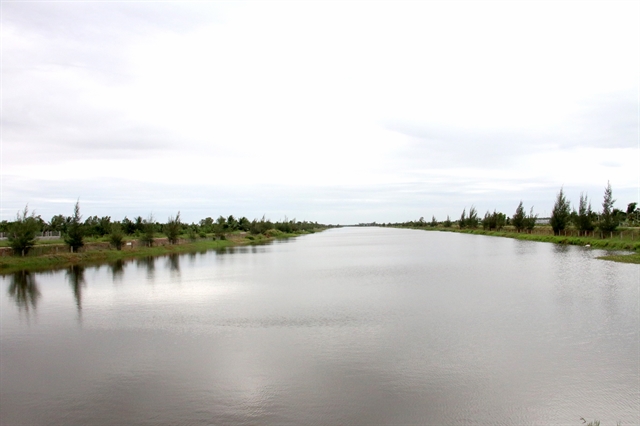
HCM CITY — Saltwater intrusion in the Cửu Long (Mekong) Delta’s rivers is expected to be less severe than last year, according to the Ministry of Agriculture and Rural Development’s Irrigation Department.
Water from the sea is likely to enter 50 – 65km up rivers in February and March, 15 – 25km less than last year.
It is expected to reduce gradually in April.
The delta, the country’s largest producer of rice, fruit and seafood, suffers from saltwater intrusion annually in the dry season that lasts from December to April.
In the Vàm Cỏ, one of the delta’s main rivers, the salinity content is expected to rise to four grammes per litre in March and April. Most crops can only tolerate less than one gramme.
The department has urged the delta’s 12 provinces and Cần Thơ City to use water efficiently and distribute it properly to ensure irrigation of the summer – autumn crop.
Local authorities have taken a number of measures to keep out saltwater and mitigate its impacts on crops and people’s lives.
They are building and fortifying sluices and dams and storing freshwater in canals, reservoirs, ditches, and ponds, and have strengthened advocacy to ensure farmers store water and use it efficiently.
In Tiền Giang Province, one of the coastal provinces hit hardest by saltwater intrusion, localities are storing water.
In Trà Vinh Province, the local Department of Agriculture and Rural Development and localities are speeding up construction of irrigation works to ensure they supply water this dry season.
The province has nearly 54,000ha of rice and 31,800ha of short-term crops in 2021 – 22 winter – spring season.
Vĩnh Long Province has made plans to secure water to irrigate 50,000ha of rice and 23,300ha of short-term crops in the ongoing winter – spring season. It also plans to provide water to more than 14,200 households in rural areas that do not get tap water.
Saltwater intrusion in the Cái Lớn and Cái Bé rivers in Kiên Giang Province has been controlled with the construction of the delta’s largest irrigation system.
The Cái Lớn – Cái Bé irrigation system serves a total area of 384,120ha of agricultural and aquaculture in Cà Mau, Bạc Liêu, Sóc Trăng, Hậu Giang, and Kiên Giang provinces.
Tiền Giang builds more irrigation projects
The Cửu Long (Mekong) Delta province of Tiền Giang is spending VNĐ38 billion (US$1.7 million) on irrigation projects to prevent saltwater intrusion in the ongoing 2021 – 22 dry season.
It plans to build a steel dam to store freshwater on each of eight important irrigation canals, Nguyễn Tấn Thành, Ông Hổ, Cầu Sao, Rạch Me, Mỹ Long, Chín Tương, Bà Trà, and Ông Mười, according to its Department of Agriculture and Rural Development.
It will repair sluices on Rạch Chợ, Thủ Ngữ, Ông Thiệm, and Cầu Kênh canals to enhance their capacity to keep out saltwater and store freshwater.
It will dredge Đường Trâu, Kênh Giữa, Xóm Đen, Kênh Một, Kênh Hai, Xóm Gồng, and Bảo Châu – Xã Sách canals.
These works will help protect more than 74,000ha of fruits, 49,000ha of winter – spring rice and 2,800ha of vegetables from saltwater.
Tiền Giang, the country’s largest fruit grower, is one of the delta’s provinces hardest hit by saltwater intrusion from the sea.
The province People’s Committee has also instructed localities to dredge 75 irrigation canals that are in fields and build 19 saltwater prevention sluices. These will cost the districts a total of VNĐ56.9 billion ($2.5 million) and be completed before the end of this dry season.
It has called on the public to use irrigation water efficiently and store it in fields, ponds and other places.
The Tiền Giang Irrigation Work Exploitation and Management One Member Limited Company is monitoring saltwater intrusion around the clock and publishing the data in the media.
The Department of Agriculture and Rural Development has instructed farmers to immediately harvest their ripened winter – spring rice crop to escape saltwater intrusion.
It has encouraged rice farmers in areas without irrigation to switch to other crops that require less water.
Saltwater intrusion in the Tiền River, a tributary of the Mekong, and high tides are combining to contaminate farming areas since February 1. — VnExpress News
- Reduce Hair Loss with PURA D’OR Gold Label Shampoo
- Castor Oil Has Made a “Huge” Difference With Hair and Brow Growth
- Excessive hair loss in men: Signs of illness that cannot be subjective
- Dịch Vụ SEO Website ở Los Angeles, CA: đưa trang web doanh nghiệp bạn lên top Google
- Nails Salon Sierra Madre
 VnExpress News The News Gateway of Vietnam
VnExpress News The News Gateway of Vietnam





